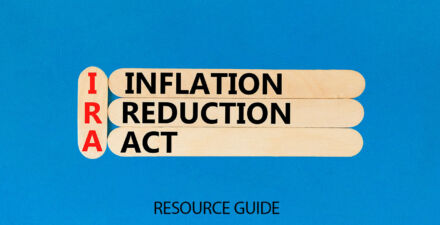Equitable Growth supports scholars studying the economics of the energy transition

The Washington Center for Equitable Growth today announced a new cohort of grantees. These nine scholars will study how the design and implementation of federal policy influences how businesses and regions innovate and invest as part of the energy transition, and the resulting effects on workers and local labor markets.
The Biden-Harris administration’s signature climate legislation, the Inflation Reduction Act of 2022, was widely touted as the most significant climate action in U.S. history, appropriating $145.4 billion in grants with additional incentives available through tax credits and loans. A few years later, however, the One Big Beautiful Bill Act was passed by Congress and signed into law in July 2025 and winds down many of the Inflation Reduction Act’s key provisions.
Still, estimates suggest that more than two-thirds of those grant dollars appropriated by law—or roughly $90 billion—were already obligated prior to the passage of the One Big Beautiful Bill Act. And while many of the tax credits are now set to expire more quickly due to that 2025 bill, roughly $3.3 billion of those credits were claimed just for electric vehicle tax credits in 2023 alone.
These variations offer researchers an opportunity to study how companies and consumers respond to shifting incentive structures, as well as examine the economic effects of the energy transition more broadly. The move away from fossil fuels and toward renewable sources of energy presents opportunities to drive innovation and investment, create new jobs, and revive distressed local economies. Yet it also poses risks to workers and regional economies dependent on the fossil-fuel industry.
Earlier this year, Equitable Growth issued a Request for Proposals for research that generates evidence on the Inflation Reduction Act’s effect on labor markets and regions, as well as innovation and investment in clean energy, in order to inform future policymaking. The new Equitable Growth grantees who responded to this RFP will look at areas such as the 2022 law’s subsidies for electric vehicles, solar supply chain effects, place-based policies that aim to ease the transition from fossil fuels, and the labor market implications of various IRA tax credits.
More specifically, the four funded projects are as follows:
- “IRA Subsidies for Electric Vehicles, Import Tariffs, and Domestic Industry.” The University of Maryland’s Joshua Linn and Louis Preonas will compare the effects of the Inflation Reduction Act and of tariffs on the new vehicle market and the domestic manufacturing industry to see how each policy affects incentives to expand U.S. industrial capacity. They seek to examine the impact of switching from subsidies to tariffs on electric vehicle prices, short-term domestic production and profits, and long-run investments in capacity and production.
- “The Economic Effects of Clean Energy Manufacturing Provisions in the Inflation Reduction Act: Evidence from the Solar Supply Chain.” Todd Gerarden of Cornell University will study the impact of two different tax credits on the solar photovoltaic supply chain in the United States. He seeks to determine how these tax credits affect investment, production, and employment along the solar power manufacturing chain and whether these effects are felt downstream with regard to solar technology adoption and environmental outcomes. This study would offer the first comprehensive assessment of the economic and environmental implications of the Inflation Reduction Act for the U.S. solar industry.
- “How Do Place-Based Policies Affect People? Lessons and Implications for the Inflation Reduction Act.” Jonathan Colmer of the University of Virginia, Eleanor Krause of the University of Kentucky, and John Voorheis at the U.S. Census Bureau will use administrative microdata to detail various energy communities in the United States. The study will look at historical patterns of the entry and exit of firms in specific U.S. regions and track employment and earnings outcomes for affected workers in those areas to determine whether displaced fossil-fuel workers benefited from new firms entering local labor markets—and whether benefits accrued to in-migrants.
- “Quantifying the Effects of Energy Transitions on the U.S. Labor Market and Implications for the Inflation Reduction Act.” The University of Wisconsin–Madison’s Mokshda Kaul, Morgan Edwards, and Corbett Grainger seek to evaluate labor market outcomes in communities that benefitted from place-based policies within the Inflation Reduction Act, compared to those regions that did not. They will then estimate the impact of the tax credits included in the Inflation Reduction Act on the affected communities, delineating their findings across worker demographic characteristics, geographic circumstances, and structural factors.
The energy transition is underway. Understanding how federal policy can effectively drive innovation and economic growth in ways that benefit workers and local economies is essential to ensuring the United States remains competitive and that workers and regions are not left behind. We look forward to seeing the actionable insights that these grantees produce.
Did you find this content informative and engaging?
Get updates and stay in tune with U.S. economic inequality and growth!




Stay updated on our latest research